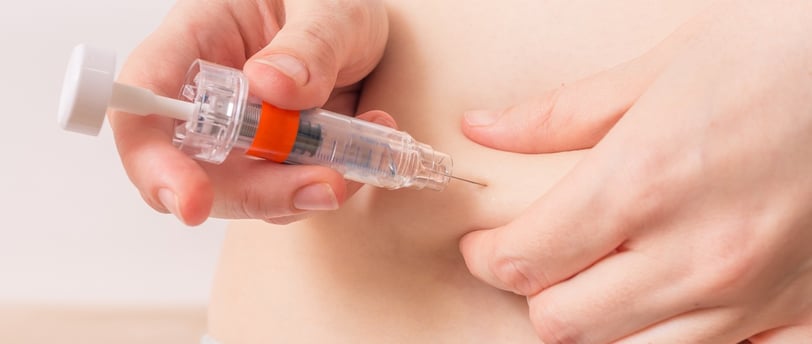Infertility: A Complete Guide to Understanding and Treatment Options
Learn all about Infertility, its role in fertility challenges, and how to overcome it.
INFERTILITY TREATMENTS
Dr. Adnan Jabbar
11/5/20246 min read


Fertility: A Complete Guide to Understanding and Treatment Options
Introduction
Fertility is a crucial aspect of reproductive health that affects both men and women. Understanding fertility is key for those planning a family, as it helps identify any challenges that might arise and offers insights into possible solutions. Many couples experience difficulty in conceiving, but advances in reproductive medicine provide effective treatment options. This guide aims to provide a comprehensive overview of fertility, factors affecting it, and available treatment options to help individuals and couples on their journey to parenthood.
Factors Affecting Fertility
Fertility is influenced by a wide range of factors, including age, lifestyle choices, underlying medical conditions, and genetic predispositions. Both men and women are affected by these factors, and understanding them can help in identifying the root cause of fertility challenges.
1. Age
Age is one of the most significant factors affecting fertility for both men and women. For women, fertility begins to decline after the age of 30, with a more pronounced decrease after age 35. This is because the quality and quantity of a woman’s eggs decrease with age, making it more challenging to conceive. By the age of 40, the chances of natural conception significantly drop, and the risk of miscarriage increases.
For men, fertility also declines with age, though the effect is generally less pronounced than in women. Sperm quality, including motility (movement) and morphology (shape), may decline as men age, which can affect the chances of successful conception. It is important for both partners to consider age as a factor when planning a family.
2. Lifestyle Choices
Lifestyle choices play a crucial role in fertility. Habits such as smoking, excessive alcohol consumption, drug use, and poor diet can negatively affect fertility in both men and women.
Smoking: Smoking is known to have a detrimental effect on fertility. In women, smoking can lead to reduced ovarian reserve and egg quality, making it more difficult to conceive. In men, smoking can lower sperm count, decrease sperm motility, and increase the risk of DNA damage in sperm, which can reduce the chances of successful fertilization and increase the risk of miscarriage.
Alcohol: Excessive alcohol consumption is also linked to decreased fertility. In women, heavy drinking can interfere with hormonal balance and ovulation, while in men, it can reduce testosterone levels, decrease sperm quality, and lead to erectile dysfunction.
Diet and Exercise: A healthy diet and regular exercise are essential for maintaining fertility. Obesity is a known risk factor for infertility, as it can lead to hormonal imbalances and disrupt ovulation in women. In men, obesity can reduce sperm quality and affect sexual function. On the other hand, being underweight can also negatively impact fertility, as it may lead to irregular menstrual cycles and decreased ovulation in women.
Stress: High levels of stress can interfere with fertility by disrupting hormonal balance. Chronic stress can lead to irregular menstrual cycles in women and reduce sperm production in men. Managing stress through techniques such as yoga, meditation, and counseling can improve fertility outcomes.
3. Medical Conditions
Certain medical conditions can impact fertility in both men and women. Understanding these conditions and seeking appropriate treatment can help improve the chances of conception.
Polycystic Ovary Syndrome (PCOS): PCOS is a common hormonal disorder that affects women of reproductive age. It is characterized by irregular menstrual cycles, the presence of multiple cysts on the ovaries, and elevated levels of androgens (male hormones). PCOS can interfere with ovulation, making it difficult for women to conceive.
Endometriosis: Endometriosis is a condition in which the tissue that normally lines the inside of the uterus grows outside of it, causing pain and inflammation. This condition can affect fertility by blocking the fallopian tubes, preventing the egg and sperm from meeting.
Male Factor Infertility: Male factor infertility refers to issues related to sperm production, quality, or delivery that affect a man’s ability to father a child. Common causes of male factor infertility include low sperm count, poor sperm motility, abnormal sperm morphology, and blockages in the reproductive tract.
Thyroid Disorders: Both hyperthyroidism (overactive thyroid) and hypothyroidism (underactive thyroid) can affect fertility in men and women. Thyroid hormones play a critical role in regulating the menstrual cycle and ovulation, and any imbalance can lead to fertility issues.
Other Conditions: Conditions such as diabetes, autoimmune disorders, and sexually transmitted infections (STIs) can also impact fertility. Proper management of these conditions is essential for improving fertility outcomes.
4. Genetic Factors
Genetic factors can also play a role in fertility. Certain genetic conditions, such as chromosomal abnormalities, can affect the quality of eggs or sperm and lead to fertility challenges. Genetic testing and counseling can help identify potential genetic issues and guide couples in making informed decisions about their fertility treatment options.
Treatment Options
There are several treatment options available for individuals and couples experiencing fertility challenges. The choice of treatment depends on the underlying cause of infertility, the age of the partners, and other individual factors. Below are some common fertility treatment options:
1. Lifestyle Modifications
In many cases, making positive lifestyle changes can improve fertility. Quitting smoking, reducing alcohol consumption, maintaining a healthy weight, and managing stress are all important steps that can enhance fertility in both men and women. Couples are encouraged to adopt a healthy lifestyle before starting fertility treatment to improve their chances of success.
2. Medications
Fertility medications are often the first line of treatment for infertility. These medications are used to stimulate ovulation in women who have irregular menstrual cycles or do not ovulate at all. Common fertility medications include:
Clomiphene Citrate: This medication is used to stimulate ovulation by increasing the production of hormones that trigger the release of an egg.
Gonadotropins: These are injectable hormones that stimulate the ovaries to produce multiple eggs. Gonadotropins are often used in combination with other fertility treatments, such as intrauterine insemination (IUI) or in vitro fertilization (IVF).
Metformin: Metformin is sometimes used to treat women with PCOS who have insulin resistance. It can help regulate menstrual cycles and improve ovulation.
3. Intrauterine Insemination (IUI)
IUI is a procedure in which sperm is directly placed into a woman’s uterus during ovulation to increase the chances of fertilization. IUI is often used in cases of mild male factor infertility, unexplained infertility, or when there are issues with cervical mucus that may prevent sperm from reaching the egg.
4. In Vitro Fertilization (IVF)
IVF is one of the most well-known and effective fertility treatments. It involves stimulating the ovaries to produce multiple eggs, retrieving the eggs, fertilizing them with sperm in a laboratory, and transferring the resulting embryos into the uterus. IVF is used in cases of severe male factor infertility, blocked fallopian tubes, endometriosis, or when other treatments have failed.
5. Intracytoplasmic Sperm Injection (ICSI)
ICSI is a specialized form of IVF used to treat severe male factor infertility. In ICSI, a single sperm is injected directly into an egg to achieve fertilization. This technique is used when there are issues with sperm count, motility, or morphology that make natural fertilization unlikely.
6. Assisted Hatching
Assisted hatching is a procedure used in conjunction with IVF to help the embryo implant into the uterine lining. It involves creating a small opening in the outer layer of the embryo (the zona pellucida) to facilitate implantation. Assisted hatching is often recommended for women of advanced maternal age or those who have had previous unsuccessful IVF cycles.
7. Donor Eggs or Sperm
In cases where the quality of eggs or sperm is compromised, donor eggs or sperm may be used to achieve pregnancy. Donor eggs are often used by women who have a low ovarian reserve or poor egg quality, while donor sperm is used in cases of severe male factor infertility or when there is no male partner.
8. Surrogacy
Surrogacy is an option for couples who are unable to carry a pregnancy to term. In gestational surrogacy, an embryo created through IVF is transferred to a surrogate, who carries the pregnancy on behalf of the intended parents. Surrogacy is often used in cases of uterine abnormalities, recurrent pregnancy loss, or medical conditions that make pregnancy unsafe for the intended mother.
Conclusion
Understanding fertility and the factors that can affect it is the first step towards achieving a successful pregnancy. Fertility challenges can be overwhelming, but advances in reproductive medicine offer hope to many individuals and couples. By identifying the factors that may be impacting fertility and exploring the available treatment options, couples can make informed decisions about their journey to parenthood.
If you are experiencing difficulty in conceiving, consult with a fertility specialist to determine the best course of action. With the right support, lifestyle changes, and medical interventions, many couples can overcome fertility challenges and realize their dream of starting a family.


